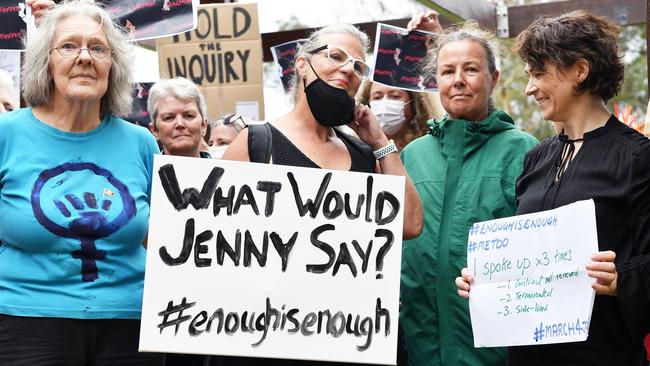
I’ve been thinking a lot about that recently as Australia grapples with a difficult conversation about issues centred on the treatment of women in parliament and more broadly. At the heart of it are personal stories, the sharing of which takes extraordinary courage. Laying bare your most vulnerable moments before the nation is not for the faint-hearted.
While powerful, it is far from the only one display of strength. And while there is undoubtedly a wave of momentum in the public and policy arena on this issue, I would like to gently propose that not all momentum takes everyone along for the ride.
In the space of a month, the national dialogue on this one issue has become circular, almost self-feeding in a way. It has become introspective, seemingly not interested in answers and forward progress but in blame. Always, the focus is on blame. But what about redemption? Solutions?
It troubles me that this conversation is getting louder because what happens when the noise drowns out other dialogue on issues that are just as important to all women? Women who may not be sexual assault survivors but who are certainly no less courageous. Women who are nameless and faceless, if you want to frame it that way. Who get up every day and fret about how they’re going to feed their kids. Manage their jobs. Will they have a job? Perhaps save enough for a holiday? They are anxious about myriad issues that require courage. Daily courage. Unglamorous, uncelebrated courage. Day in, day out. The underlying issues are no less worth of our attention.
I hear the terms women’s policy and women’ issues thrown about all the time, and it makes me bristle. Can I tell you what women’s policy issues are? Tax reform. Superannuation. Housing and education. Access to affordable aged-care support for elderly parents. These are issues that face all women.
Women aren’t a monolith. We are not a cohort with one policy concern. We are not the gendered equivalent of the Shooters, Fishers and Farmers Party.
Women (like me) own and run our own companies. We pay tax. GST. Company tax. Payroll tax. Income tax. We employ women — in my case, exclusively so; and without putting too fine a point on it, I’m responsible for their financial futures. For their school fees and mortgages and holidays they might like to take. For their sense of security and their ability to go about their lives. That is no small responsibility and I feel the weight of it. Many of you know what I’m talking about.
And before you go there, I am not equating running a business with surviving sexual assault. I know an incredible woman, a friend, who is a domestic violence survivor, a parent and a small-business owner. She didn’t go to the March 4 Justice. Her courage is no less valid, no less worthy and no less deserving of a policy agenda that doesn’t speak to only one issue. She is not alone.
When the tens of millions of Australian women get up every morning, our thoughts and motivations are not singular and myopic. We collectively care about the terrible state of tertiary education in this country. About how far Australia’s secondary education standing has fallen in comparison with other developed countries. About freedom of speech and religion. About industrial relations reform. The state of our healthcare system, and the ability of Australia to support a manufacturing industry that will potentially employ our kids and theirs to come. We care about the plight of Indigenous women and their children in parts of Australia that are apparently invisible to many who claim to be speaking for all women.
A dear, wise friend of mine (a working mum of two young children) asked this past week: how has the national policy agenda been hijacked by a singular issue, important though it may be? And why aren’t we as women allowed to talk about anything else without being shouted down?
Why indeed.
As others have observed, this current agenda is already in danger of further politicisation (it already has been, with a singular and at times vicious focus on the behaviour of conservatives), and likewise risks being undermined by activism and partisan dialogue.
This iteration of the women’s movement boldly has professed to speak for all of us. I don’t believe it does and I fear that a disproportionate focus on one issue will end up costing women.
All women.
Gemma Tognini is executive director of GT Communications.







Courage has many faces. I’ve always believed that. Strength is not always found in the noise, in the shouting and the loudest roar. Courage is often in the still, small voices or those that are perhaps never heard at all.